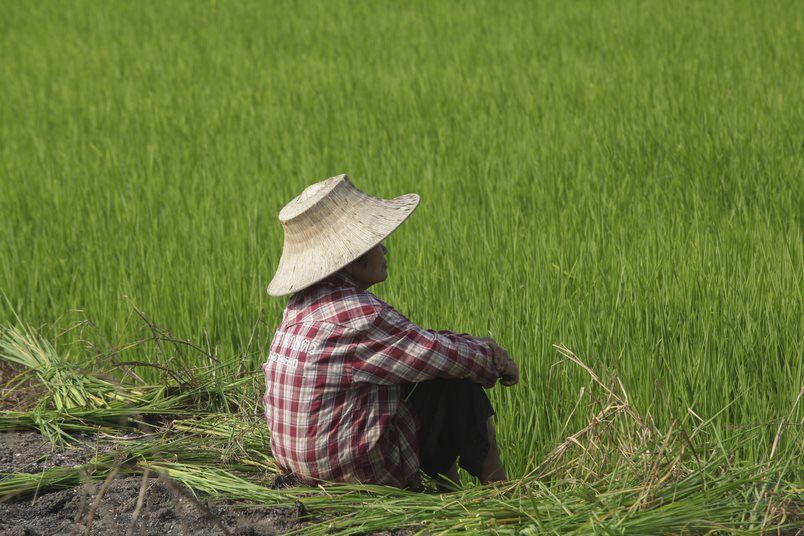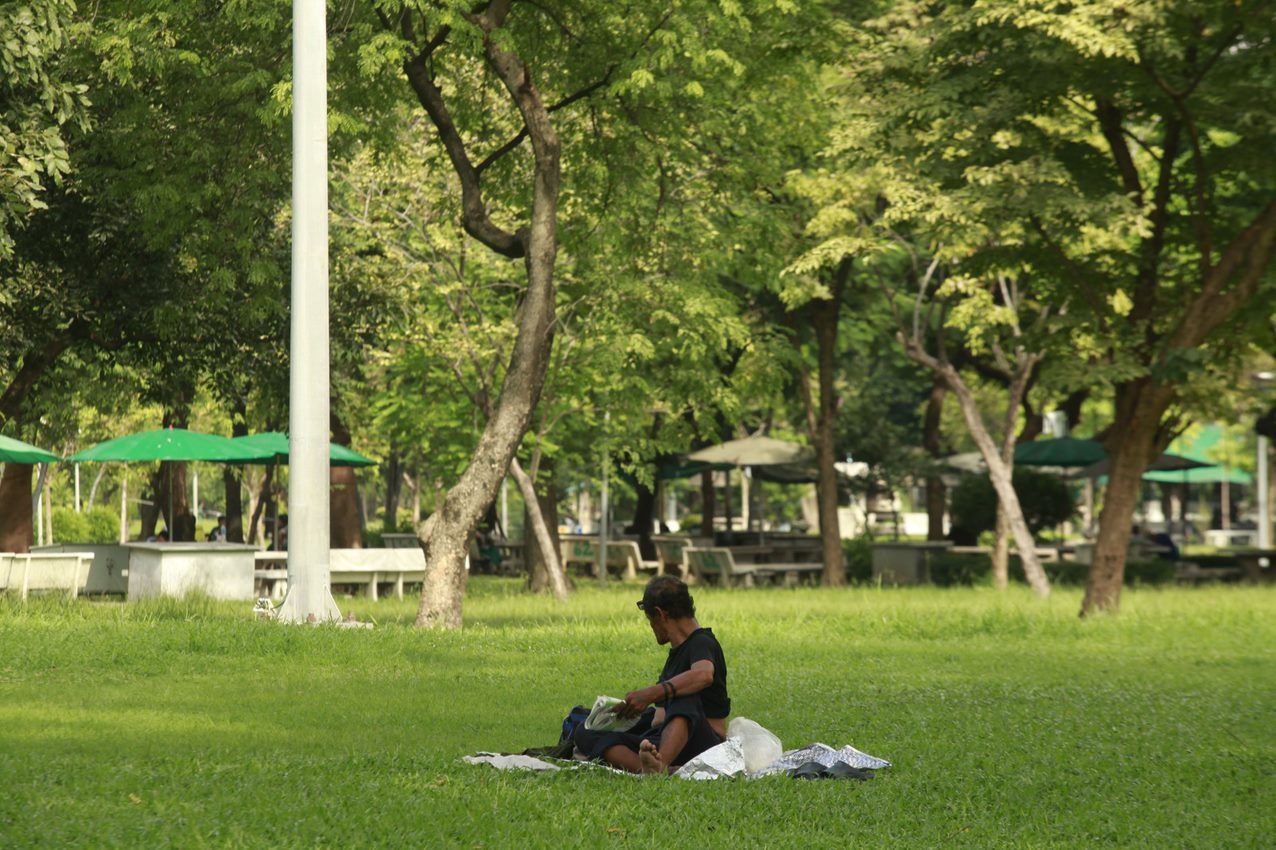The farm sector has been a driving engine behind Thailand’s economic growth, but at the same time, debt among farmers has been rising.
The main product of farming is rice.
Last year, the value of rice traded was 174.5 billion baht (US$5.7 billion), entailing 12.89% of all farming products.
Logically, rice farmers should be enjoying wealthy profits.
But the uncertainties of farming – unmerciful weather, droughts and floods, fluctuating prices and rising costs – enslave rice farmers to debts.
“Thai farmers are getting into more and more debt because they can draw on all kinds of financial sources. All governments have a raft of policies to help farmers get finance at low interest rates. But farming is a high risk career with variable returns,”
The government has offered help, but to no avail.
Farming debt, often incurred by rice farmers, rose from 2.4 trillion baht in 2016 to 2.8 trillion baht as of last year, according to the National Statistical Office (NOS).
Among 3.8 million debtors with state-funded loans, 1.1 million of them are farmers, according to the NOS.
In August 2017, hundreds of rice farmers gathering in front of commercial banks and the Bank for Agriculture and Agricultural Cooperatives (BAAC) demanded help.
The government granted them debt relief, with interest cuts.
However the larger question still remains: how can Thailand tackle farmers debt so it disappears for good?
CAUSE OF DEBT
Samree Treesawat, a 54 year-old farmer from Ayutthaya province, was among the farmers who joined the protest at the BAAC.
“I can see no future. The price of rice has gone down every year since the coup. I make no profit from rice plantations. I have been a farmer since I was young. I can’t change to a new job,” Mr Samree told the Bangkok Post.
10 years ago, Seree borrowed one million baht from the BAAC to develop his home and launch a grocery business as a second job apart from growing rice.
During the early years, he was able to make debt repayments, but stopped them over the past four years.
Total interest payments have reached 300,000 baht.

Mr Samree said he does not own his own land, so the costs are higher, and production costs in general have increased. Like many other rice farmers, Mr Samree rents land to plant rice.
Although, the harvest gave him plenty of rice to sell, he was still unable to make enough money to repay his debt.
First, Mr Samree needed to earmark 150 kilograms of paddy rice per rai (1,600 square metres) to repay his landlord.
His landlord prefers rice to cash. Landlords make easy money selling rice when the price in the world market jumps.
If not, they can still make money from a government subsidy under the rice mortgage scheme.
If droughts hit or the weather is otherwise cruel, Mr Samree could end up owing rent.
Even if he had not harvested enough rice to pay rent to his landlord, he still needed to pay for production costs such as oil for tractors, chemical pesticides, chemical fertilisers and seeds.
TOO MUCH HELP
Based on a study by the Thailand Development Research Institute (TDRI) in 2016, almost a quarter of all farm debts are owed to state banks.
Kamphol Pantakua, a researcher from the TDRI, said farmers have borrowed money from banks for further investment, which can return benefits of up to 77%.
That makes good sense economically, except farmers do not borrow for farming only.
Around 34% of them borrow for developing or buying a house or residential plot, 15% for education, 14% for improving the farming business, 14% for doing business, 10% on general consumption and 13% for other purposes.
The problem is therefore not about lacking loans or financial help.
“Thai farmers are getting into more and more debt because they can draw on all kinds of financial sources. All governments have a raft of policies to help farmers get finance at low interest rates. But farming is a high risk career with variable returns,” said Kamphol.
He explained that rice is a commodity that is easy to sell, but not much of a money-maker.
The price of rice fluctuates greatly based on the world market, not to mention fierce competition.
“Farmers could reap a 50% profit or suffer a loss just as big at any time,” he said.
The TDRI researcher also found that policies to help farmers are a problem in themselves.
To tackle the debt problem, many governments also implemented debt suspension schemes.
Governments also provided other non-financial sources of support, such as coupons for cheaper fuel and fertiliser.
They also offered special loans with long-term payments and low interest rates to farmers. Interest rates for farmers from state banks are the lowest in Asean – amounting to less than 2%.
Kamphol said that the government should reduce subsidies to the farming sector and cultivate self-sufficiency.
He said the government should play a new role as a “funding agency” to support farmers and raise capacity.
The government, he said, should pull in academics, local NGOS, and state officials to create a new strategy to solve farmer debt.
“But if the government still puts in large volumes of money to farmers with little efficiency, it will burden the country as money is drawn away from developing other fields,” he said.
MORE AND BETTER LOANS
The president of the BAAC, Apirom Sukprasert, said that non-performing loans at the BAAC are still at an “acceptable” level.
“Most farmers have skills in financial management. They can repay debt on time. But we still have some with problems, and we welcome them to discuss them with us,” Sukprasert said.
About 1.5 million people who are debtors of the bank have registered as poor under the government’s scheme to help those with little money and the value of their debt is about 300,000 baht per person on average.
“I can see no future. The price of rice has gone down every year since the coup. I make no profit from rice plantations. I have been a farmer since I was young. I can’t change to a new job,”
He said the bank has more flexible channels to help farmers improve their quality of life, compared with the past when loans were limited to agricultural purposes only.
“Now, our clients can get financial loans for education or real estate purchases, with different interest rates.”
However, the important thing, he added, is the bank will work with agencies to create “immunity” for those farmers.
Farmers are shown how to cultivate financial discipline and increase personal savings.
The bank has also offered measures to attract more savings from farmers.
Most popular among clients are lucky draw competitions, with winners drawn from those with deposit accounts.
Sukprasert said the BAAC is approving soft loans to 452 cooperative farmers nationwide, which will be allocated to support farmers to help cut production costs and increase income.
This is done under the government’s agricultural reform policy.
The private sector, for its part, will help farmers distribute their products to customers.
“We can no longer be focused on debt suspension or loans alone. We must focus on making farmers more disciplined and more financially independent, as that is the way to become debt free.”
This story by Penchan Charoensuthipan was first published by The Bangkok Post on October 28, 2018.
BEHIND THE STORY
In August 2017, hundreds of rice farmers converged in front of commercial banks and the BAAC to demand for help after they were unable to pay off farming loans. The significant gathering of these farmers prompted The Bangkok Post to turn its attention to farmer debt in Thailand. It also raised the question of how Thailand could better tackle it. Anucha Charoenpo, the news editor at the Bangkok Post, later discussed the idea with the writer and encouraged her to investigate a number of farmers in debt with state-funded loans, the cause of their debt and what loan assistance packages each farmer received. The story has encouraged all stakeholders involved – especially the Thai government – to pay more attention to the problems of farmer debt while rice farmers who were themselves in debt were alerted to the changes they needed to make. This included practising increasing discipline and making themselves more financially independent.


